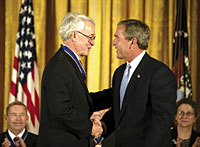
Biography
James Q. Wilson was an American political scientist who made major contributions to the understanding of urban politics, policing and crime, political organizations, bureaucracy, and character and culture. Wilson was also an accomplished scuba diver and a life-long fan of the Boston Red Sox. He was born on May 27, 1931, in Denver, Colorado, and was raised in Long Beach, California. He passed away on March 2, 2012, in Boston, Massachusetts.
Wilson received a BA in Political Science (Summa Cum Laude) from the University of Redlands in 1952. He was the national collegiate debate champion in 1951 and 1952. He served in the United States Navy from 1952 to 1955 before heading to the University of Chicago to pursue graduate work in political science. He received a Ph.D. from the Department of Political Science at the University of Chicago in 1959. His Ph. D. dissertation was an analysis of the political behavior of African Americans in Chicago during the 1950s and was the basis for his first book, Negro Politics: The Search for Leadership (1960).
Wilson was a faculty member of the Harvard University Department of Government from 1961 to 1987. He was appointed Henry Lee Shattuck Professor of Government in 1972 and served as Chairman of the department from 1969 to 1973. He was also Director of the Joint Center for Urban Studies of MIT and Harvard from 1963 to 1966. From 1987 to 1997, he was James A. Collins Professor of Management and Public Policy at the Anderson School of Management at the University of California, Los Angeles. From 1998 to 2009, he was Ronald Reagan Professor of Public Policy at Pepperdine University. From 2009 until his death, he was Distinguished Scholar in the Department of Political Science and Senior Fellow at the Clough Center for the Study of Constitutional Democracy at Boston College.
Wilson was a prolific author of essays and book reviews and authored, coauthored, or edited some 26 books, including City Politics (1963, with Edward C. Banfield), The Amateur Democrat (1966), Varieties of Police Behavior (1968), Political Organizations (1973), Thinking about Crime (1975), The Politics of Regulation (1980), Bureaucracy (1989), The Moral Sense (1993), The Marriage Problem (2002), and Understanding America (2008, with Peter H. Schuck). Wilson’s American Government: Institutions and Policies (with John J. DiIulio, Jr.) has gone through 13 editions and is one of the most widely used textbooks on American government and politics.
Wilson chaired the White House Task Force on Crime (1966) and the National Advisory Commission on Drug Abuse Prevention (1972-1973). He was a member of the Attorney General’s Task Force on Violent Crime (1981), the President’s Foreign Intelligence Advisory Board (1985-1990), and the President’s Council on Bioethics (2002-2005). He served on the boards of the New England Electric System, Protection One, State Farm Mutual Insurance, the RAND Corporation, and the Pardee RAND Graduate School. He chaired the Council of Academic Advisors of the American Enterprise Institute.
He received numerous awards from the American Political Science Association (APSA), including the Charles E. Merriam Award for significant contributions to the art of government (1977), the James Madison Award for distinguished scholarly contribution to political science (1990), and the John Gaus Award for “exemplary scholarship in the joint tradition of political science and public administration” (1994). In 1991-1992, he served as APSA’s President. In 2003, Wilson was awarded the Presidential Medal of Freedom, the nation’s highest civilian award. In 2007, he received the Bradley Prize from the Lynde and Harry Bradley Foundation. He was awarded honorary degrees from seven universities, including Harvard.
Wilson’s papers are to be archived at the Pardee RAND Graduate School.
